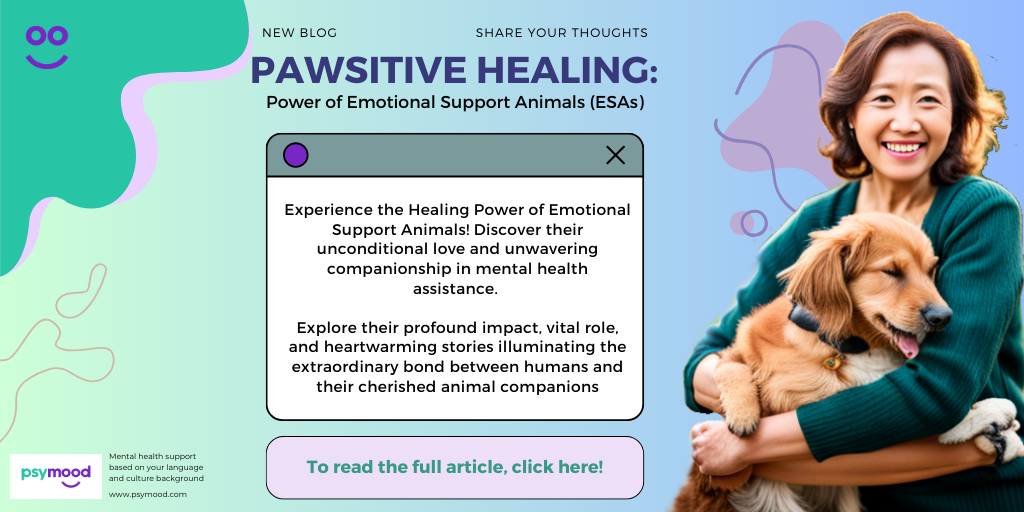Pawsitive Healing: Power of Emotional Support Animals (ESAs)
Within the complex realm of mental health assistance, there is a unique presence of unconditional love and companionship in the form of Emotional Support Animals (ESAs), whether they have fur, feathers, or scales. These extraordinary companions go beyond the scope of traditional pets; they serve as healers, trusted confidants, and a constant source of solace for individuals traversing the challenging terrain of mental health. In this blog post, we’ll explore the profound healing impact of Emotional Support Animals, shedding light on their role, benefits, and heartwarming stories that showcase the incredible bond between humans and their animal companions.
Introduction: More than just pets
Emotional Support Animals (ESAs) are more than adorable creatures sharing our homes. For those grappling with mental health challenges, they are lifelines, offering solace, unconditional love, and a unique form of therapy. Unlike service animals, ESAs provide emotional support through their presence, offering a sense of security and stability to their owners.
Why Emotional Support Animals Matter:
Emotional Support Animals serve a crucial role in the lives of individuals dealing with mental health challenges. Here’s why they matter:
- Unconditional Support: ESAs offer unwavering love and acceptance, providing a sense of security and belonging that can be incredibly comforting for someone struggling with anxiety, depression, or other emotional disorders.
- Stress Reduction: The presence of an ESA has been scientifically proven to lower cortisol levels (the stress hormone), thereby reducing stress and anxiety. Their calming influence can make a significant difference in a person’s daily life.
- Alleviating Loneliness: Loneliness can exacerbate mental health issues. Emotional Support Animals offer constant companionship, alleviating feelings of isolation and providing genuine, non-judgmental affection.
- Enhancing Social Interactions: ESAs often act as social bridges, making it easier for their owners to interact with others. This increased social interaction can boost confidence and improve overall emotional well-being.
Advantages of Emotional Support Animals:
- No Discrimination: Unlike service animals, ESAs are not limited to specific tasks. They provide emotional support, making them accessible to individuals with various mental health conditions.
- Travel and Housing Accommodations: In many countries, Emotional Support Animals are protected by laws that allow them to accompany their owners in housing that might otherwise have pet restrictions. They can also travel in the cabin of airplanes with their owners.
- Customized Support: Emotional Support Animals can be any species, tailoring the support to the individual’s preferences and needs. Whether it’s a dog, cat, rabbit, or even a miniature horse, the choice is based on what brings the most comfort.
Fun Fact:
If you didn’t realize till now, Emotional Support Animals can be dogs, cats, birds, rabbits, guinea pigs, or even miniature pigs. The species can vary widely based on the individual’s preference and comfort.
In conclusion, emotional support animals are a crucial lifeline for those who are dealing with mental health issues. They are crucial allies on the path to mental well-being due to their unwavering affection, calming presence, and legal protections. As we continue to learn about the profound impact of these incredible animals, their importance in the realm of mental health support cannot be overstated.
PsyMood is a digital tool designed to help you find the support you need in the language that you are most comfortable with. PsyMood considers cultural background, geographical location, interests, and personal needs, amongst other factors, to pair you with service providers for either online or in-person therapy sessions.
For More Interesting Posts
You may also be interested in learning more about Bed Rotting – A Trend Among Gen Z and Its effecting Mental Health, The Immersive World of 8D Music, and Work Life Balance: A Guide For The Sandwich Generation.


.png)
.png)
.png)
Recent Comments